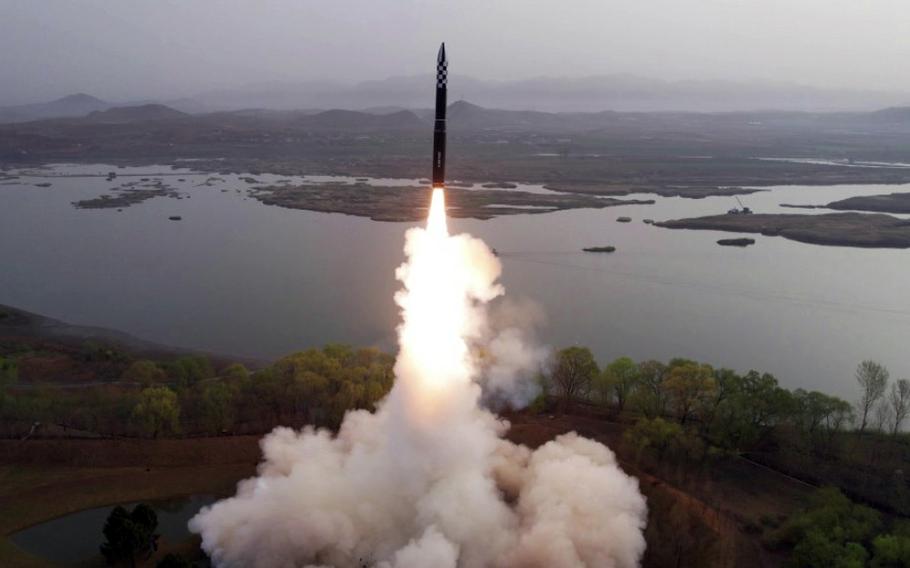
North Korea launches a Hwasong-18 intercontinental ballistic missile on April 13, 2023, according to the state-run Korean Central News Agency. (KCNA)
TOKYO — The United States and its two strongest allies in the Far East are planning more data-sharing and three-way military drills amid threats posed by China, North Korea and Russia.
Defense chiefs from the U.S., Japan and South Korea met Sunday and agreed to accelerate plans for multinational exercises and speed up data-sharing on North Korean missile launches, according to a readout of the meeting released by the Defense Department that day.
Secretary of Defense Lloyd Austin and South Korean Minister of National Defense Shin Won-sik met in Seoul, joined virtually by Japanese Minister of Defense Minoru Kihara.
The leaders discussed North Korean nuclear and missile threats, the war in Ukraine, peace and stability across the Taiwan Strait and dangerous activities involving ships and aircraft in and over the East and South China Seas, according to the readout.
“They reaffirmed their commitment to stand with Ukraine against Russia’s unprovoked and brutal war of aggression, and recognized that Russia’s actions are a serious violation of sovereignty that undermine the fabric of the international order,” the readout said.
The three decided to speed up data-sharing on North Korean missile launches and improve their ability to monitor those incidents, according to the readout.
“They confirmed that the data sharing mechanism is in the final stages of testing and agreed to fully operationalize the mechanism by the end of December,” the readout stated.
The defense chiefs also want to hasten a plan for trilateral exercises, according to the readout. Last month, their countries carried out air drills together for the first time ever.
Kihara told reporters after the meeting that such gatherings are important based on severe security threats facing the three nations, according to a transcript of his news conference released by Japan’s Defense Ministry.
Military drills involving the three nations will likely become regular from next year, according to Kim Hyun Wook, an American studies professor at Korea National Diplomatic Academy in Seoul.
“The US definitely wants Japan-Korea military cooperation upgraded,” he said in an email Monday.
However, Japan worries that a change of government in South Korea could mean an end to the cooperation, Kim said.
That concern was echoed by James Brown, an international affairs expert at Temple University’s Japan campus.
“Call me a cynic, but I can’t see this lasting,” he said in an email Monday. “I fear that a change in leadership in South Korea will undermine much of the good work that has been done over the last year.”
Likewise, a new administration in the U.S. could undermine relations if it’s less committed to alliances, Brown added.